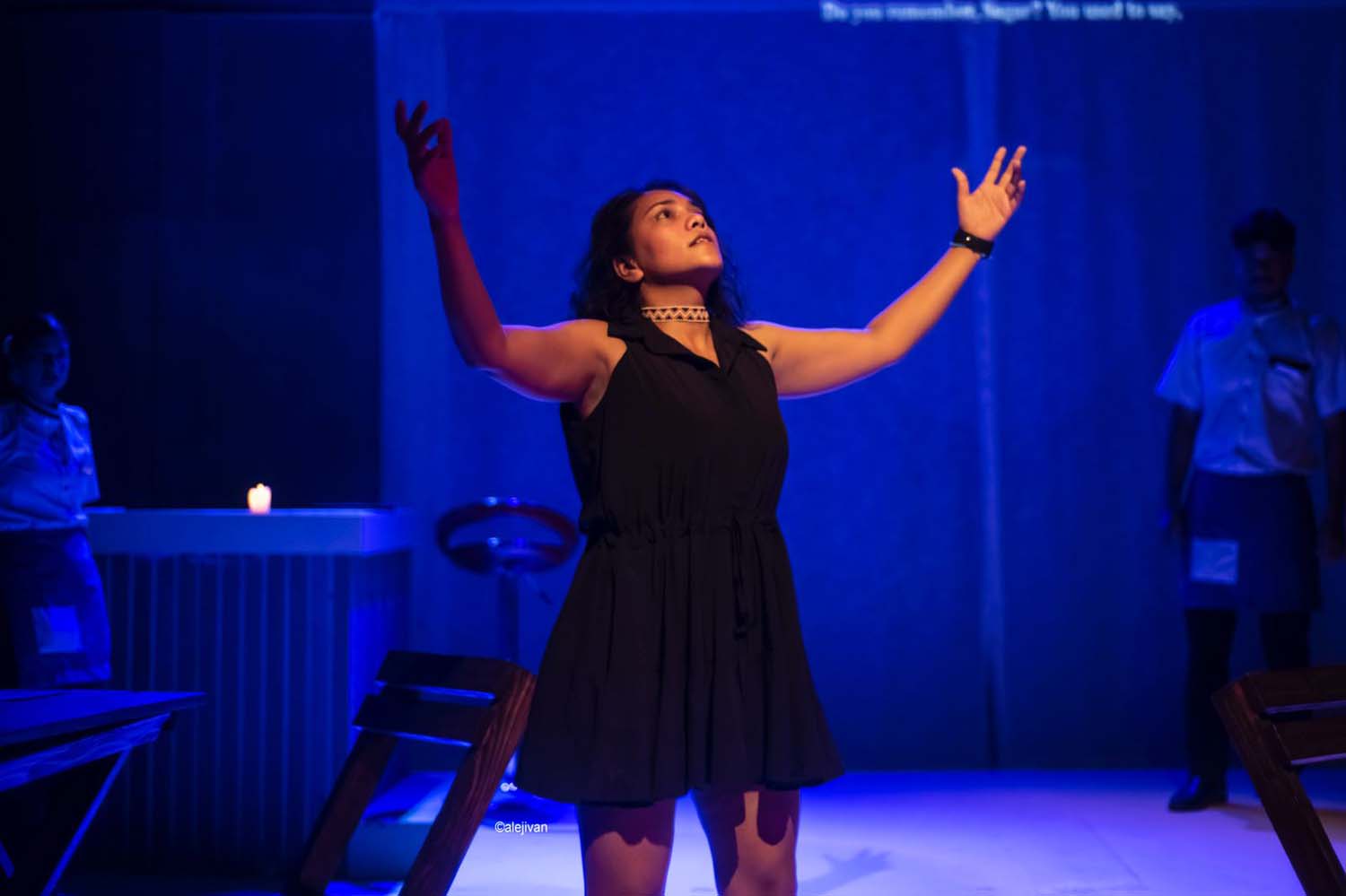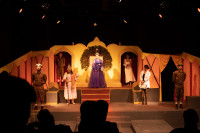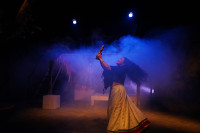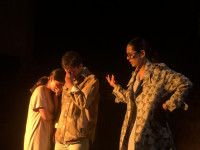Theater
Intense, honest, human
With standout performances and immersive transitions, ‘Lost and Found’ reflects on identity, vulnerability, and the beauty of being seen and heard.
Sanskriti Pokharel
A beautifully lit café with an aesthetically pleasing ambience. Jazz music plays softly in the background. At one of the tables, a man and a woman sit across from one another, deep in conversation.
The man has greying hair and is dressed modestly. The woman opposite is young and stylish. From how they speak and lean in with interest, it’s clear that they have not met before, and both are equally curious to learn about the other.
This is the opening scene of Shilpee Theatre’s ongoing play, ‘Lost and Found.’ The man, Sagar (Sumit Bhandari), is a 48-year-old tourist visiting from Canada. Bhumi (Pabitra Khadka) is a 25-year-old Nepali woman working as a tourist guide. Their names are as opposite as how they are as people, and their lives are far from ordinary.
Bhumi is stateless, meaning she doesn’t have citizenship or officially belong to any country. She was raised by a single mother and carries with her the heavy burden of the past. To make things more complex, Bhumi lives with dissociative identity disorder, a mental health condition formerly known as multiple personality disorder, which causes her to shift between different identities.
Sagar, on the other hand, is a man caught in the middle of a personal crisis. He is unhappy with his marriage and is considering divorce. His trip to Nepal is more than just a vacation. It is a way for him to escape the weight of his everyday life and try something new, something different.
Watching these two interact makes the play engaging. Despite coming from different worlds, their connection feels real.
Bhumi carries many burdens, but she’s also vibrant and full of energy, and she brings a certain liveliness wherever she goes. In contrast, Sagar is emotionally closed off. But when he’s around Bhumi, her warm nature softens his seriousness, and he becomes playful. She adds colour to his otherwise dull presence. Seeing this is heartwarming.

In a memorable scene, Bhumi encourages Sagar to stand on a chair and introduce himself out loud. At first, he is uncomfortable. Sensing his reluctance, Bhumi takes the lead. Without a hint of self-consciousness, she climbs onto the chair and boldly begins introducing herself to the entire café. She speaks clearly, sharing personal details about her life with no shame. People around her can hear everything, but she doesn’t seem to mind. She owns her story, her voice, and that moment.
Watching her feels empowering. She is playful, confident, and free. The way she stands tall and unapologetic is reminiscent of those iconic moments in films where the heroine climbs onto a bar table and dances freely, boldly and carefree, unbothered by what others might think.
Not to mention, in that very same scene, Bhumi openly says that she likes sex. In Nepali cinemas and plays, it is seldom that a female character openly expresses her sexual desires. Her honesty is refreshing and powerful. She doesn’t shy away from speaking about something considered taboo. And she does this without hesitation, without seeking approval or fearing judgment.
Additionally, the Café, a liminal space, is neither home nor entirely public. It is a place for pause and possibility. It becomes a metaphor for the emotional space both characters occupy: somewhere between staying and leaving.
‘Lost and Found’ is a powerhouse of performance. The acting is so convincing that, although we know it’s a play, it feels real. Much of the story unfolds in a café setting, where Bhumi and Sagar engage in thoughtful, layered conversations. But the background action adds even more depth to these scenes.
The waiter (Govinda Oli) and waitress (Suhana Acharya) aren’t just standing idly. They are immersed in their roles, busy with their tasks in a way that’s both believable and entertaining. Their presence adds texture to the scene, so the audience often finds themselves unsure of where to look. Should the focus be on the central characters or the animated café staff in the background?
One of the powerful elements of the play is how Bhumi’s dissociative identity disorder is portrayed. She often experiences episodes during emotionally intense conversations, especially when the topics turn sad or triggering. The transitions are chilling. It starts as a subtle trembling of her body and quickly escalates into rapid shaking and incoherent shouting. These moments are amplified by sudden lightning and background music changes, which make the experience immersive. When Bhumi returns to normal, the music softens and the lights shift to a warm, calming tone. These transitions are executed seamlessly.
Another memorable scene takes place in the setting of Lumbini, where a visual of Gautam Buddha’s palace is projected onto a screen. However, the palace design leans more towards Mughal architecture, which may leave some viewers wondering about its historical accuracy.
A small but significant detail is the use of English subtitles projected onto the screen. Although there didn’t seem to be any foreign tourists in the audience the day I attended, including subtitles makes the play more accessible and inclusive. That said, the timing of the subtitles occasionally felt off. Sometimes subtitles appeared too early or too late compared to the spoken dialogue.
Visually, the play is a treat. The costumes and lighting design are stunning and carefully chosen to enhance the mood and setting of each scene. And finally, the play isn’t without its moments of humour. A few cheeky, suggestive lines brought out hearty laughter from the audience, adding a playful touch to an otherwise intense narrative.
Lastly, the title is simple yet deep. Both Bhumi and Sagar are ‘lost’ in different ways, physically, emotionally, and spiritually. Through their conversations and connection, they begin to find fragments of themselves. The ‘found’ isn’t about resolution or romance, but recognition and finding someone who sees you.
_____
Lost and Found
Director: Ghimire Yubaraj
Cast: Pabitra Khadka, Sumit Bhandari, Suhana Acharya
Duration: 1 hour 40 minutes
Venue: Shilpee Theatre, Battisputali
Showtimes: Every day at 5:15 pm except Tuesday and an extra 1:00 pm show on Saturday until May 31




 11.12°C Kathmandu
11.12°C Kathmandu











